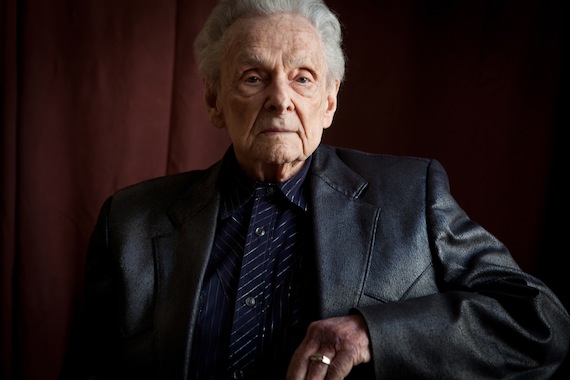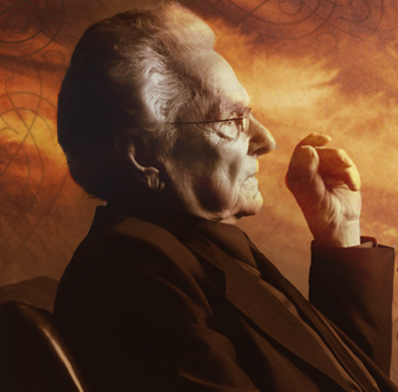

Ralph Stanley
Funeral arrangements for Ralph Stanley took place Tuesday, June 28, at Hills of Home Park. The service was open to the public.
Hills of Home Park is located on Carter Stanley Highway on Smith Ridge between Coeburn and McClure, Virginia. The park is the location for Stanley’s annual music festival.
In lieu of flowers, it was requested that donations be sent to the Shriners Hospital for Children and St. Jude’s Children’s Research Hospital.
[Previous story, posted June 23, 2016]:
Grand Ole Opry star Ralph Stanley—whose haunting voice became known to millions on the hugely successful album O Brother, Where Art Thou—has died at age 89.
Stanley was the last living figure of the founding generation of bluegrass music, since Bill Monroe, Carter Stanley, Lester Flatt and Earl Scruggs had all preceded him in death. He was also the Opry’s oldest member.
The mountain-music icon won a 2001 Grammy Award for his performance of “O Death.” That song’s acclaimed parent album, O Brother, Where Art Thou, also earned the Grammy for Album of the Year. Selling in excess of eight million copies, this was the soundtrack album for a George Clooney film of the same name. The Stanley Brothers’ classic version of “Angel Band” was on the album too.
Ralph Edmund Stanley was born in the mountains of southwestern Virginia, in the same region that also produced The Carter Family, a major influence on him. Ralph Stanley began playing banjo as a teenager. After serving in the Army, he joined older brother Carter Stanley (1925-1966) in forming The Stanley Brothers & The Clinch Mountain Boys in 1946.
For the first dozen years of its existence, the group climbed to regional fame in Bristol on WCYB’s Farm and Fun Time radio show. Deeply impressed by the sound of Monroe and his Blue Grass Boys, the Stanleys initially incorporated many of that group’s songs into their repertoire.
But they soon began introducing original songs. These were usually penned by Carter Stanley, although Ralph composed a number of banjo instrumentals.
The Stanley Brothers signed with Columbia Records in 1949. Furious that they were basing their sound on “his” music, Monroe left the label in protest and signed with Decca. The two acts later reconciled.
During their Columbia years, the Stanleys recorded many of their signature songs, including “The White Dove,” “Little Glass of Wine,” “The Angels Are Singing in Heaven Tonight” and “I Am a Man of Constant Sorrow.”
They signed with Starday/King Records in the 1956, which is where the bulk of the Stanleys’ catalog resides. Stanley Brothers records from their affiliation with these labels included “Rank Stranger,” “Little Maggie,” “Gonna Paint the Town,” “Ridin’ That Midnight Train” and a bluegrass version of Hank Ballard’s r&b hit “Finger Poppin’ Time.”
During this period, the brothers became popular on the collegiate folk circuit. They performed at the Newport Folk Festival in 1959 and 1964.
In the early 1960s, The Stanley Brothers hosted their own TV show in central Florida. In 1965, they appeared in Fincastle, VA at what is now regarded as the first bluegrass festival.
Carter Stanley’s escalating alcoholism led to his death from complications of liver cirrhosis in late 1966 at age 41. He had been the team’s lead singer and chief songwriter. Grief-stricken Ralph was uncertain whether or not to proceed, but fans urged him to carry on with The Clinch Mountain Boys. The group trained such future bluegrass greats as Charlie Sizemore, Larry Sparks, Melvin Goins and Roy Lee Centers.
Kentucky teenagers Ricky Skaggs and Keith Whitley joined Stanley’s band in 1970 and recorded the acclaimed Cry From the Cross and Something Old, Something New albums with the master during their tenure in his group. In addition to Skaggs and Whitley, Stanley is cited as an influence by Dwight Yoakam, Emmylou Harris and Jim Lauderdale, not to mention a galaxy of bluegrass artists.

Beginning in 1971, Ralph Stanley recorded for more than 40 years for Rebel Records. He won an IBMA (International Bluegrass Music Association) award for 1998’s double CD on Rebel, Clinch Mountain Country. It featured him singing with George Jones, Bob Dylan, Hal Ketchum, Patty Loveless, Marty Stuart, Diamond Rio, Alison Krauss, John Anderson, Connie Smith, Junior Brown, Vern Gosdin and more.
His 2001 Rebel release, Clinch Mountain Sweethearts, found him collaborating with Dolly Parton, Pam Tillis, Gillian Welch, Maria Muldaur, Sara Evans, Joan Baez, Melba Montgomery, Lucinda Williams, Jeannie Seely, Gail Davies and others. This also won an IBMA award.
Ralph Stanley focused more and more on traditional Appalachian sounds as he aged, frequently performing a cappella gospel songs. Son Ralph Stanley II and grandson Nathan Stanley eventually became lead singers of The Clinch Mountain Boys.
Tennessee’s Lincoln University gave Ralph Stanley an honorary Doctorate degree in 1976. Thereafter, he was loftily dubbed “Dr. Ralph.” He was presented with a National Heritage Fellowship honor by the National Endowment for the Arts in 1984.
Stanley was invited to perform at the inaugurations of both Jimmy Carter (1977) and Bill Clinton (1993). In 1992, The Stanley Brothers were inducted into the Bluegrass Hall of Fame.
The Grand Ole Opry made Ralph Stanley a cast member in 2000. The Library of Congress named him a Living Legend in that same year. In 2002, he won another Grammy. This one was for an album recorded with Jim Lauderdale titled Lost in the Lonesome Pines.
Further honors were showered on him in subsequent years. He was given a National Medal of Arts honor in 2006, an Outstanding Virginian award in 2008, an honorary Doctorate of Music degree from Yale in 2014 and an election as a fellow of the American Academy of Arts and Sciences, also in 2014.
His final album was 2015’s Ralph Stanley and Friends. Co-produced by Lauderdale and Buddy Miller, it featured admirers Dierks Bentley, Del McCoury, Gillian Welch, Old Crow Medicine Show, Robert Plant and more.
Ralph Stanley died on June 23 of complications from skin cancer. He is survived by wife Jimmie Stanley and children Lisa Stanley Marshall, Tonya Armes Stanley and Ralph Stanley II. He’s also survived by grandchildren Nathan Stanley, Amber Meade Stanley, Evan Stout, Ashley Marshall, Alexis Marshall, Taylor Stanley and Ralph Stanley III, plus great-grandchild McKenzie Stanley.

About the Author
Robert K. Oermann is a longtime contributor to MusicRow. He is a respected music critic, author and historian.View Author Profile


